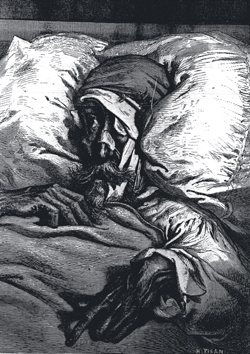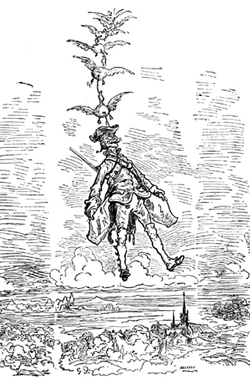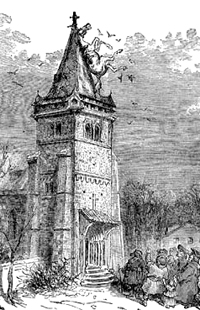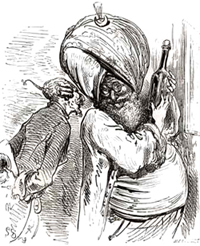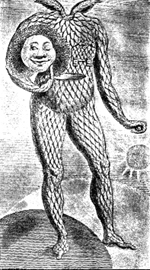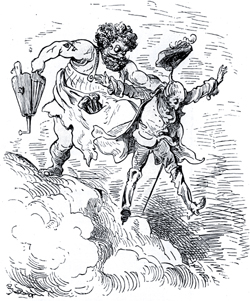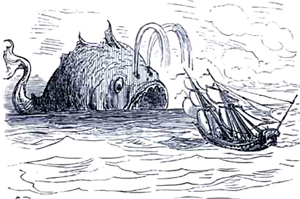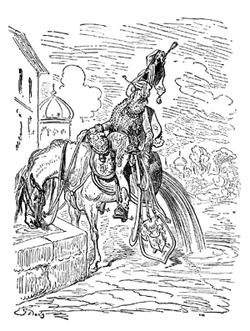THE TERRY GILLIAM FILES // "MUNCHAUSEN" (1989) |
MUNCHAUSEN: Script Development | 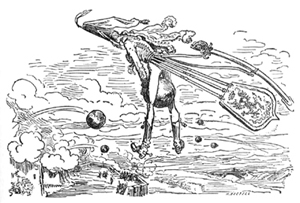 |
|
Terry Gilliam had asked Charles McKeown to help develop a screenplay based on Rudlof Raspe's Munchausen stories as production of BRAZIL was winding down. A first draft dated November 1985 (with Arnon Milchan's name attached as producer) was put on the back burner as Gilliam's attention was turned towards the struggle with Universal Pictures to release BRAZIL in its intended form. McKeown had appeared in stage and TV productions in the late '70s, including plays and episodes of the series "Ripping Yarns" written by Michael Palin and Terry Jones. McKeown claims his bone structure made him popular for playing "clergymen and psychopaths." "In 1978 Michael Palin asked me if I would go with a group of us they called their 'rep company' to Tunisia to make LIFE OF BRIAN. I played about 10 different parts, with various beards, and that was [where] I first met Terry. I played a blind man who falls down a hole, and I think Terry was very impressed by the way in which I fell down this hole, as a result of which he asked me to co-write BRAZIL with him!" McKeown also acted in BRAZIL as well as TIME BANDITS, in which he played the manager of a decimated theatre desperate to please his audience, the Emperor Napoleon. For their screen adaptation of the Munchausen legend, McKeown and Gilliam took the Sultan's Tale [an apocryphal Munchausen tale which first appeared in Burger's German edition] as the major narrative drive of the screenplay, rather than to have a loose collection of disparate Munchausen yarns. The creation of the Henry Salt and Son Players and the city under siege by an invading army also provided the framework for dramatic tension. In this first draft of the script, the story is remarkably similar to what the original, approved shooting script would be two years later (before further cuts were made for budgetary reasons). What are noticeably different are the initial appearance of the Baron, the style in which some of the Munchausen tales were to be presented, and the demeanor of both Henry and Sally Salt. Horatio Jackson comes across as more of a mercenary in his dealings with the Turks, and there is even a hint that Rose, the young actress, resorts to prostitution with a soldier to help survive the siege. What follows is a summary of this first draft, plus comments on the differences in characterization, plot points, and how Gilliam and McKeown envisioned the style of the piece.
The opening titles, over a tasteful engraving, sets the scene as "Eighteenth Century Europe, The Age of Reason. Having broken the shackles of the past, mankind enters a new era of progress and enlightenment ..." A single cannon shot directly into the audience refutes that supposition. [Later drafts indicated that clockwork mechanisms would be used as a background.] We immediately cut to the city under siege, and an open-air theatre where the Henry Salt and Son Players are performing a tedious moonlit shipboard melodrama before an empty house. Sally, an 11-year-old girl wearing a costume of the figure of Death, sneaks up behind her father backstage and taps him on the shoulder with her scythe. Although she is proud of having cleaned the costume, Henry admonishes her with a great contempt. A cannonball interrupts the performance. "Henry Salt and Sons Royal Theatre has not missed an advertised performance for forty-seven years! Are we or are we not professionals?" Nonetheless, soldiers appear to requisition the backdrop canvases to use for stretchers. Sally, hidden understage, operates a trap door, sending a soldier plummeting to oblivion, followed by her father. At the town hall, in a makeshift hospital, a surgeon complains that he can't sort through the varied limbs piled high on a table. "Too many left arms from the Light Infantry, and not enough right legs from the Gunners and the Blues. How am I supposed to do a decent job?" Salt has come to plead his case with Horatio Jackson. Jackson commiserates with the loss of scenery, but is proud that conditions in the town are not worse. "I'm delighted to be able to tell you that the proportion of fatalities per fighting day in relation to our adult population, is well below the average for this type of warfare at this time of year." Jackson is then introduced to the wounded officer responsible for destroying six enemy cannon and the ammunition depot; Jackson orders him executed. We later see this soldier hanging from a noose. At the theatre, the hunger is readily obvious; a traumatized musician eats a rats (we see the tail sticking from his mouth, similar to a gag in TIME BANDITS). Henry, still angry over the trap door incident, sends Sally to bed without supper from the communal pot. Salt, desperate for an idea for a new production that will bring in the crowds (and justify the theatre company to Jackson), falls asleep that night at his desk with a blank sheet titled "Act I, Scene I." Sally, sneaking from her hammock to steal a bone from the pot, hears a commotion upstairs. Upon investigating, a dog appears and steals her bone. Sally chases after the dog into the night. Outside, we see for the first time the Turkish fleet in the harbor, and wounded citizens held in a corridor who have been categorized according to profession.
There she finds the Baron, lying emaciated in bed. Death leans over him, trying to remove a "fluttering glowing something" from his mouth. Death is frightened by Sally's presence and disappears. [Death is remarkably skittish in this draft.] The Baron, sensing Sally there, grabs her; she screams. He realizes she is a child and apologizes and begins telling her about his travels to the Moon. Sally then explains that she has been to the Moon as well, and has fought a dragon there. The Baron is adamant that she is lying, that there are no lunar dragons. [In the final script, Sally's own imagination is not nearly as pronounced; a brief scene where she tells Violet that she attended a sumptuous banquet on the Moon was then cut.]
Sally's insistence forces him to read a second story, in which his horse fails to clear a river, and so he is forced to pick himself and the horse up out of the water by holding his own pigtail. The Baron is energized by telling these stories: "You can do anything if you want to É" But his misery at being unable to fit into a rational world causes him despair. He dismisses Sally, who steals the book as she leaves. Salt, angry at Sally's absence, takes away the book, and threatens to burn it if she doesn't obey his commands to go to bed. The book nonetheless provides him with the inspiration for his new production. He eagerly sets about writing what is then advertised as "The Great Morale Boosting Military Show; An Entirely New Serio Comic Pantomime, with new Music, Scenery, Dresses and Decoration É" Sally takes a poster advertising the show, goes to the Baron's locked building, and drops it into his letter box.
The Baron arrives, castigates the proceedings and tells the audience that he was responsible for the Sultan's attack on the town. He then tells the tale of the bottle of Tokay. [Here, though, the character of Berthold is named Walter; Gustavus is named Dennis; Adolphus is Ralph; and Albrecht is Colin. Although members of the Salt troupe appear as their counterparts, the Baron makes no pretense of recognizing them backstage.]
The Sultan's tale ends as in the film, till we return to the theatre under bombardment. Jackson pronounces the theatre closed, and Sally runs to the battlements, with the Baron following her. To silence the enemy cannon, the Baron jumps onto the wall and lights a cannon, being carried away on the cannonball; he steers himself using his coattails. Death is glimpsed, but does not attack, and the Baron exchanges cannonballs in mid-air and returns. Impressed by the actresses, the Baron vows to save the town. The Baron's voice-over then explains how he fashions a balloon out of ladies' underwear to escape the city as we see the undulating mass of silk. [Here, it is more plainly apparent that the construction of the balloon — and everything that follows — is a mere story told by the Baron.] Jackson is warned about the escape attempt, but the Colonel (perhaps remembering the fate of the ammo-destroying soldier) hesitates taking action: "I've no desire to shine, sir." Soldiers arrive at the theatre, but the Baron takes off with his dog, Argus. He dumps Sally out of the ballast bag into the galleon. [In the shooting script, that had been changed to where she is dropped overboard and caught on a church spire.] As they sail off, it is the first time we see the Turkish troops. The galleon rips away the roof of the Sultan's tent, revealing him in a compromising position.
We then flashback to 20 years before, where the Baron is attending a banquet with the giant King and Queen of the Moon. There is much merriment, even when a sick guest's head flies off and pukes in a bucket. The Baron is overcome by sensual delight in the Queen's ample bosom, but we return to present before discovering what the King's anger had wrought. The Prime Minister also reminds the Baron that it is the day of the total eclipse, when memories are forgotten. [This would help the Baron's situation vis a vis the King, but then again it wouldn't help the Baron any to forget everything as well.] The Baron is recognized by Walter, who nonetheless cannot remember how he ended up in prison on the Moon. They are released by Queen Ariadne; the Baron, playing up to her emotions, promises to marry her (wink, wink) if she helps them escape. As guards approach, the Baron stuffs his coat into the Queen's mouth to silence her orgasmic cries. One bit of slapstick finds a pair of soldier's detached heads trying to look up the skirt of a passing woman; she pulls a gun from her blouse and fires at them. The heads duck and weave to avoid the bullets. As part of the celebration of the eclipse, a Royal Griffin Chase (like a fox hunt) is prepared, where the King's crown is hidden inside a mechanical griffiness. The Baron, with visions of grandeur of actually obtaining the crown himself, climbs inside the griffiness and ignites its engine fuse by striking his fist against his head like a flint. Sparks fly from his eyes, and the trio is soon off. The griffins chasing the griffiness end up destroying each other, but Sally and Walter wrest the crown from the Baron ["It fits them, it's too big for you."] and toss it back to the King. They then climb down from the Moon and fall towards Earth, remaining suspended in mid-air momentarily (as in a cartoon) by the warm air coming form Mount Etna.
Surfacing in the ocean on the other side of the world, the four are snagged on ropes and carried up in a rising junk. Pirates appear. The Baron tries to explain who he is, but the Pirate Captain doesn't buy it. ["Yeah .. and I am a saintly missionary and this is a home for retired gentlefolks."] One pirate is overcome with a splinter in his finger, and as the sympathetic Colin assist him, other pirates end up killing each other in a mad struggle to get at the oblivious Colin. ["Dead?" he exclaims, seeing the dead pirate. "From a splinter?"]
Sailing into harbor among the Turkish fleet, the wheezing Dennis cannot blow away their ships, and Ralph's pathetic attempt to assassinate the Turkish Admiral with his musket only invites enemy gunfire. The crew wash up on shore, and the Baron resolves to give himself up. Inside the Sultan's tent, Jackson and the Sultan are toasting to their agreed-upon Conduct of War. ["Here's to our mutually profitable war," Jackson says; "Long may it last," replies the Turk.] When the Baron appears, the Sultan orders him executed, but also offers him a last drink. As the executioner's scimitar falls, a blast from Ralph's musket knocks it away. The battle begins; the Baron wields his sword, Colin uses his strength to swing Turkish ships around so that their blasting cannons face each other, and Dennis' breath causes havoc. Walter spies a Turkish soldier aiming a musket at the Baron, and races off; he grabs the musket in a split second just as the trigger is pulled, and smashes the gun over the soldier's head.
Once the two halves of Bucephalus are stitched up with a laurel branch, the Baron rides back to town. He spots Death, grabs it by the hood, and tosses it into the air; the figure falls and turns into a stone gargoyle on a roof of the liberated town. During the victory parade, Jackson fires at the Baron, who falls to the ground. The stone gargoyle returns to life (death?), and swoops down. Death pulls something from the Baron's mouth, which flutters away and dissolves into the air. The funeral then cuts back to the Royal Theatre, where the Baron is declaiming upon that particular instance of his death. Jackson (apparently having sat through this entire performance in the royal box) orders the Baron arrested "for spreading ridiculous tales which have no foundation in truth." The Baron leads the audience to the gates of the city, though which we see that the Turks have disappeared. The townspeople rejoice, and the Baron picks a rose that has grown from Bucephalus' laurel canopy and gives it to Sally before riding toward the open plain.
| |||||||||||||||||||||||||||||||||
copyright 1992, 2009 by David Morgan
All rights reserved.








